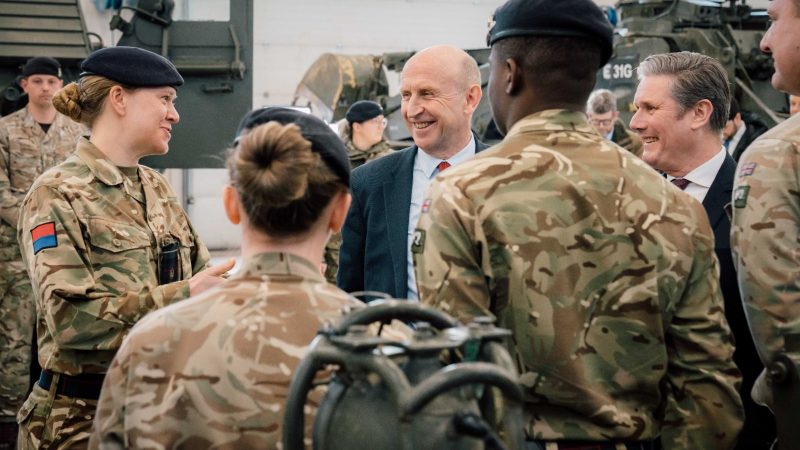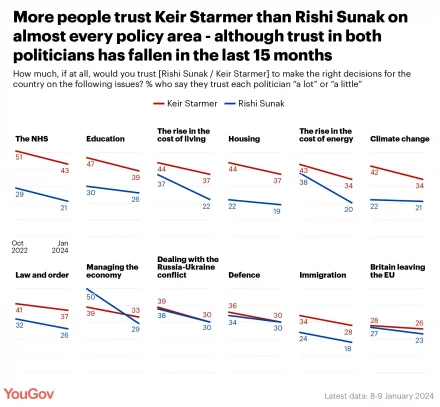
Keir Starmer should be quietly confident. At the start of what most people think will be an election year, recent polling by YouGov shows that the Labour leader is considered more trustworthy than Rishi Sunak in almost every policy area.
Such are the perceived failings of this government among the electorate that Sunak is now trailing Starmer in policy areas in which the Conservatives have traditionally polled strongly, such as managing the economy and law and order, where he trails by four percentage points and 11 percentage points respectively.
Even in the area of immigration policy, where the Conservatives have expended vast political capital on attention-grabbing policies like the Bibby Stockholm barge and the Rwanda scheme, Sunak is behind by ten percentage points.
The two main policy areas where Starmer has not been able to open up a lead is on handling the war in Ukraine and defence more generally, where the two leaders are tied at 30% for both issues.
These figures don’t accurately capture the wider disillusionment with the Conservatives in regards to defence and national security, where a separate YouGov tracking poll shows that support for the party, as opposed to Sunak personally, has fallen from highs of 44% in early 2020, to lows of just 23% last month.
This presents Starmer with an opportunity to seize the initiative in this area and outline a set of strong policy positions to claim this space, but also to do this with a Labour twist.
These policy ideas would help Labour seize the agenda on defence
These policies should include scrapping the planned reduction in the size of the army from 82,000 to 72,500 personnel, which is reportedly unpopular amongst many military leaders, and revisiting the decision to reduce the number of Challenger 3 main battle tanks to just 148.
It should also include funding to replenish arms already sent to Ukraine as part of the £4.6bn package of military support agreed as of October 2023, as well as ensuring further supplies can be sent if needed.
These hard policies, however, should be balanced by more traditionally left-wing policies including continued high levels of support for veterans and addressing the appalling state of accommodation for armed forces families.
There should also be a desire to drive efficiencies in the defence space, including efforts to hold defence firms and contractors to account for cost overruns and procurement issues when they arise.
A good example of this would be the outsourcing of army recruitment to Capita in 2012. A 2019 report by the House of Commons public accounts committee branded Capita’s performance as “abysmal since it started, and it has failed to meet the army’s recruitment targets every single year of the contract”. Despite this damning verdict, in 2020, Capita still secured a £140m, two-year extension to the contract.
In an unstable world, defence policy could be a voter winner

Claiming the initiative on defence is important, and not just for jingoistic reasons. The world is an increasingly dangerous and unstable place – with data from the Uppsala Conflict Data Program showing that 2022 saw the highest number of people dying in organised violence since the 1994 Rwandan genocide. And it looks like 2023, for which the complete data is not yet compiled, may exceed even this tragic figure.
Furthermore, conflict was occurring in even more places, with 55 active conflicts taking place around the world, the highest number since 1946 and double the number taking place a decade before.
In response to events in just the last few months, the UK has deployed warships to both Guyana and the Gulf Region and launched several air strikes against Houthi forces in Yemen. This is on top of a recent major naval exercise to protect critical underseas cables and pipes from hostile (read Russian) interference.
In times of stability, voters rarely make competence in defence a vote-winning issue, but if the European security situation continues to worsen this year, such as through Russian “grey zone” activity in the Baltic states, then voters may return to the Conservatives as the traditional party of security.
Starmer has a rare opportunity to seize the initiative and stake a claim to this policy area now, and thus show strength and leadership in a dangerous world.




More from LabourList
‘Council Tax shouldn’t punish those who have the least or those we owe the most’
Two-thirds of Labour members say government has made too many policy U-turns, poll reveals
‘Two states, one future: five steps on the path to peace for Israelis and Palestinians’